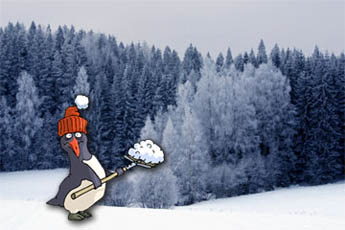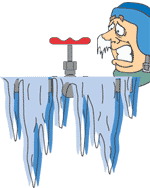
As the Summer season winds down many of us look forward to the cooler temperatures and fall colors. But we must not forget what is lurking behind those crisp fall days - old man winter!
It is hard to determine what type of winter will be in store for your region. The wooly worms may know more than the meteorologists and both know a lot more about predicting the type of winter we are to be blessed with then me, but regardless of what mother nature brings our way, it is best to prepare for the worst.
Inspect for Leaks
As fall approaches you should inspect the exterior of your home for openings that could let in cold wind and repair, fill and/or caulk as needed (or contact your homeowner's association if you live in a condo for them to make these repairs). Hoses should be removed from outside faucets and their shut off values should be closed before the temperatures drop below freezing. Checking and replacing seals around your windows, garage, and exterior doors will also help keep the cold out.
Pruning
Your fall pruning should be completed by winter if possible and sensitive perennials and roses should be cut back and covered. Fall is also a great time for you or your homeowner association to fertilize your lawn and plantings because your plants are actively storing up nutrients through their roots in anticipation of the Spring growth surge.
Check Your Flue!
Those homes with wood burning fireplaces need clean chimneys. An unclean flue is a dangerous situation which if left alone could easily start a fire which could burn your house down and may even take a life! Speaking of life, homes sealed up during the heating season are much more accessible to carbon monoxide build up which can be lethal. Installing a carbon monoxide detector may save your own and your loved ones lives.
Freezing Pipes

During those really cold days and nights keep those interior faucets (especially exterior wall sinks) running at a pencil lead thin stream along with keeping the vanity doors open for heat access around the pipes. Insulating the incoming water lines before they get to the water heater, if they are in a cold area such as a crawl space, basement, unheated garage, or by an exterior wall, is a sound preventive measure. Keep emergency supplies (ready to eat foods, water, battery operated radio, candles, blankets, cards, etc.) as well as emergency phone numbers on hand for power loss and/or when weather conditions may find you trapped in your home for longer then you anticipated.
I hope you have found the above suggestions helpful. There are many other steps that can be taken to conserve utility usage, make your home more comfortable, minimize freeze damages and make the winter season not just bearable but hopefully enjoyable as well. Your power company and insurance agent are good sources for additional information regarding preparing for winter. When the snow flies and the Canadian winds howl, with just a little planning, you will be as snug as a wooly worm in the tropics in your winter ready haven you call home.
 Print
Print Email
Email






